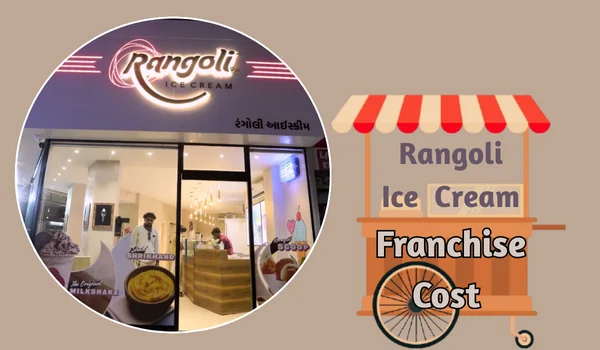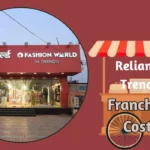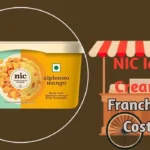If you’re considering an ice-cream franchise that combines regional popularity with artisanal positioning, Rangoli Ice Cream (a Gujarat-based brand operating since 1999) is a name worth evaluating. Below is a practical, India-focused advisor guide covering likely investment, business models, ROI expectations, eligibility, and the step-by-step application process — plus risk checks and growth tips to help you decide.
Quick snapshot — brand & footprint
Rangoli Ice Cream is a Gujarat-rooted ice-cream brand known for parlour formats, sundaes, shakes and regional menu specialities. The company maintains an official franchise enquiry page and a contact address in Ahmedabad for prospective partners.
Franchise model(s) you’ll typically see
Rangoli’s public franchise listings and food-franchise portals indicate the brand supports unit-store franchises (parlours) — the common model for ice-cream chains. Typical formats:
- Full parlour / standalone store (900–1,200 sq ft) — full seating, display counters, shakes, sundaes and retail packs. (Recommended for high-footfall high-streets and malls.)
- Compact kiosk / counter (smaller mall footprints) — lower capex, focused on takeaway and impulse purchases.
- Delivery/cloud-kitchen overlay — using a small prep area to service aggregators; useful in dense urban pockets.
(Note: Rangoli’s franchise page requests site details via an enquiry form — exact available formats and local fit are provided after initial contact.)
Investment & franchise cost (indicative)

Publicly listed franchise summaries show a range — you should treat these as directional until you receive Rangoli’s official BOQ/LOI.
- FranchiseIndia listing (directional benchmark):
- Total investment: ₹50 lakh – ₹1 crore
- Franchise / brand fee: ₹6,00,000 (one-time)
- Royalty / commission: 4% (reported)
- Floor area required: 900–1,200 sq ft; term ~9 years.
- Smaller/alternate listings: Some franchise directories show smaller investments in the ₹5–10 lakh band for very compact formats or non-exclusive distribution deals — these may refer to different “Rangoli” brands or local tie-ups, so confirm exact brand entity and terms. (Always insist on written commercials.)
What the band covers: franchise fee; fit-out & interiors; freezers & cold-chain equipment; seating & furniture; initial inventory; POS; staff training; pre-opening marketing. Expect capex to vary sharply by city, mall vs high-street location, and interior finish level.
Expected ROI & payback
- Payback period: FranchiseIndia reports an anticipated payback of 1–2 years and an anticipated return on investment ~40% — these are optimistic but plausible in tier-1/high-traffic locations with disciplined operations.
- Profit drivers: Average bill value (ABV), table turns (seating), high-margin add-ons (thick shakes, sundaes), retail pack sales, and delivery volumes.
- Operating costs to watch: Rent (major cost in malls/high-streets), power (freezers run 24×7), staff wages, and wastage/shrinkage from perishables. Cold-chain uptime and electricity backup significantly affect margins.
Realistic modelling tip: Build a conservative P&L with scenarios at INR ₹3–5 L / ₹6–8 L / ₹10 L monthly sales to test payback horizons. If rent >12% of target sales, your payback period will lengthen.
Eligibility criteria (what Rangoli and similar ice-cream franchisors typically require)
- Financial readiness: Proof of funds for capex & working capital (the FranchiseIndia band indicates substantial capital requirement).
- Property: Ownership or long-term lease of suitable commercial premises that meet brand specifications (frontage, power load, drain/flooring). For Rangoli, portal listings show 900–1,200 sq ft as a guide.
- Operational capability: Willingness to run food retail or appoint an experienced operator; F&B experience is helpful but not always mandatory.
- Compliance: FSSAI, GST, local municipal trade license, fire NOC (if required), and adherence to food safety protocols.
- Brand fit: Commitment to follow brand SOPs, quality controls, supply chain rules and reporting.
Step-by-step: How to apply
- Preliminary research: Review Rangoli’s brand pages and franchise listings to confirm the investment band and format that matches your budget and city.
- Submit franchise enquiry: Use Rangoli’s official Franchise Enquiry form (link on their site) with site details (city, exact address or proposed location, carpet area, and promoter details).
- Discovery call & NDA: Expect a call from the brand to understand your profile; larger franchise proposals sometimes require an NDA before detailed financials are shared.
- Site inspection & approval: The brand (or its appointed partner) will evaluate catchment, visibility, neighbouring outlets and finalize format (parlour vs kiosk).
- Commercials & LOI: Ask for an itemised LOI/term sheet — franchise fee, royalty %, marketing levy, projected BOQ, timelines and performance guarantees (if any). FranchiseIndia lists a 9-year term for Rangoli, but confirm current terms.
- Agreement & fit-out: Sign the agreement, start fit-out per brand BOQ, order equipment, complete staff hiring and training.
- Pre-launch marketing & go-live: Plan the opening, local marketing and aggregator integrations (if delivery is part of your model).
- Operate & report: Follow the brand’s SOPs, attend refresher training, and use their inventory & reporting systems.
Pros, cons & red flags
Pros
- Strong regional recall in Gujarat and neighbouring markets.
- Structured franchise pack with training and IT/operational support indicated in listings.
Cons / Watchouts
- Conflicting online numbers across portals — always rely on Rangoli’s official LOI/BOQ.
- High electricity and spoilage risk — factor backup power and conservative wastage rates into your cashflow.
- Mall rents and CAM charges can materially change ROI — prefer sites with predictable footfall.
Final advice (as your franchise advisor)
- Get the official BOQ: After initial enquiry, insist on a line-by-line BOQ + sample P&L for your city and format. Rangoli’s official enquiry form is the right first move.
- Model scenarios conservatively: Use low/medium/high sales cases and stress test rent, power, and staff costs.
- Visit existing outlets: Speak to current Rangoli franchisees (brand should connect you) to validate real sales and day-to-day issues.
- Legal & financial review: Have a lawyer check the franchise agreement (term, renewal clauses, exclusivity, KPIs) and an accountant validate working-capital plans.

Shashi Kant is the Founder and Editor of BusinessScroller.com, a leading platform for business insights, finance trends, and industry analysis. With a passion for journalism and expertise in business reporting, he curates well-researched content on market strategies, startups, and corporate success stories. His vision is to provide valuable information that empowers entrepreneurs and professionals. Under his leadership, BusinessScroller.com has grown into a trusted source for in-depth articles, customer care guides, and financial expertise.



I’m interested to take the franchisee
Interested in franchise
I am interested to take the franchise in Ahmedabad location
Gir Somnath p patan